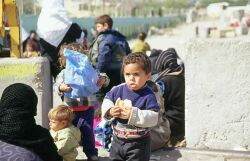30 December 2007
NO PEACE AMONG OLIVE BRANCHES
'A report in the Bristol Evening Post by a lady who gave support to a Palestinian farmer in picking olives on his land - not land promised to anyone else.'The West Bank is shredded, torn into fragments from which it will be very hard to construct a viable state.
The heat-hazed Judean hills, terraced with olive trees, have been dissected with new highways serving expensive hill-top housing developments reserved for half a million Israelis and providing a bonanza for real-estate investors.
I went to the West Bank at the invitation of a Fair Trade Palestinian olive oil company, Zaytoun. I expected a healthy break from chilly English weather, to pick olives, eat with farmers and learn about their lives.
But it turned out to be far more dramatic a visit than ever we had envisioned.
At one point I found myself alone, surrounded by threatening Israeli youths, after our car had been immobilised by slashing its tyres.
I was seriously scared. They were all wearing the tzitzit, the tasselled under-shirt of Orthodox Jews.
My crime, seemingly, was that I had just visited a Palestinian farmer.
I had gone with three of the Bristol olive pickers to meet Omar, a Palestinian farmer.
Leaving our car on what was then a quiet main road, we walked up to the farm. He told us on arrival that he had only just regained access to his 250 olive trees on the farm. He had obtained a juridical order that made the police evict the Israeli settlers who had illegally occupied it.
But the settlers had not given up. Just after our arrival, a bus-load of them arrived - and charged up to the farm house.
However, Israeli soldiers, who had arrived immediately before them in a large armoured truck, stopped the settlers.
It was a gentle clash. No tear gas, no arrests. The settlers retired after some pushing.
The army then declared the farm a closed military zone and we had to leave.
It was only when I had driven off the rough ground on to the road that I realised our front tyres were slashed. The waiting settlers jeered and laughed and came towards us.
My companions ran to ask the army for protection. In their absence the settlers closely surrounded the car but did not physically attack us.
A few minutes later, when my companions returned, I learned that the army had refused protection to us on the grounds that we had driven a few feet out of their military zone. They said we were now the responsibility of the police.
When passing motorists slowed to ask if we needed help, the settlers ordered them not to stop. When a police armoured jeep approached we thought we were safe, but a policeman said: "We don't speak English," and drove on.
However, 10 minutes later they reappeared. This time they mounted an armed protection of us, ordering the settlers off the road, protecting us until a tow truck arrived from a nearby Arab village.
That night the army and police withdrew from the farmhouse and the young settlers reoccupied it, planting the Israeli flag on its rooftop. The army evicted them again and the settlers again returned. Two days later we saw the farmhouse had a Hebrew sign on it, the settlers were picking Omar's olives, and wires were strung to the farm from the Jewish settlement across the valley to make it part of an "eruv", a Rabbi-authorized area in which Orthodox Jews can travel to and fro even on the Sabbath.
Normally setting up this requires permission, a "kinyan kesef", from the landowners but apparently this is not needed in this case.
Thus we witnessed another small part of the West Bank passing into Israeli hands.
Omar swore he would never give up but with nine children, and access to several hundred olive trees lost, the task had just become much harder.
When we returned to visit him a few days later, we found the Israeli army had blocked the main bus-route into Kafr Qaddum, the small town where Omar lived.
I asked: "Why did the army do this? Had there been any act of resistance?"
"None at all," he replied. He suggested the army was trying to push them towards revolt, so more of them could be driven from their lands to join the millions already living as refugees.
We made inquiries but there was no obvious reason for the Israelis to so punish this town.
We further discovered that the Israeli army had also destroyed the town's electricity supply, severely crippling its industries and schools. The power had been off for weeks.
Another farmer from the same town, with whom we went to pick olives, was prevented from doing so by the army despite them previously giving him a permit.
The Israelis planned to build the wall through the olive groves alongside the hall and the farmer told us that it would cut him off from his trees permanently, despite his farm lying nearly 10 miles from the recognised international boundary of the West Bank.
He was told this year that he could pick olives on only seven of the 20 days he needed, but the army would not even let him do that.
When we spoke to the town's deputy major, he said: "The wall will cut us off from about 35 per cent of our olive groves. We will do everything to stop them building it."

